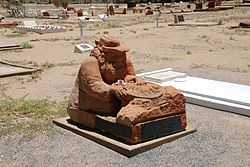Lewis Hubert (Harold Bell) Lasseter

Lewis Hubert Lasseter, or Lewis Harold Bell Lasseter as he later referred to himself, was born on 27 September 1880 at Bamganie, Victoria, Australia. Though self-educated, he was literate and well-spoken, and commonly described as eccentric and opinionated. He travelled in both Australia and the United States and worked at a variety of occupations, marrying twice and fathering five children.
Lasseter was made famous by his sensational claim, first asserted in 1929, that, as a young man, he had discovered a fabulously rich gold reef, an entity now known as “Lasseter's Reef”, in central Australia.
He perished in the desert near the Western Australia–Northern Territory border in early 1931 after he separated himself from an expedition that was mounted in an effort to rediscover the supposed reef. His body was found and buried in March 1931 by Bob Buck, a central Australian bushman and pastoralist sent to search for Lasseter. It was later re-interred in the Alice Springs cemetery.
However, the book Lasseter Did Not Lie by A. Stapleton (published in Adelaide, 1981) suggests that Lasseter was no more than a con-man, (The book does not state he was a conman it actually supports that he may have been telling the truth, with supporting evidence.)[1] having ripped off his investors in a clever scheme to convince them that such a gold reef existed, only to take their money with him to San Francisco, where he later died in the late 1950s.
Some of the facts pointing in that direction are as follows:
- Lasseter had said that when he was in Alice Springs the first time, around the time of discovering the gold reef (that is, 1897), he had posted a letter at the post office in the middle of the town. However, at the time, the post office was not in the town, which was actually known as Stuart back then, but located on the other side of the ranges, some six kilometres away, at a water hole which was called Alice Springs.
- At the time when Lasseter stated that he was first in Alice Springs, the town boasted a population of only a few hundred people, with visitors coming many weeks apart, and thus conspicuous. Furthermore, he claimed that he had arrived in the town with horses and camels in tow, and there was only one place where he could have bought such provisions. Yet nobody in Alice Springs remembered him.
- Gold specimens found in the pockets of the body alleged to have been Lasseter's were chemically analyzed and determined to have originated near Kalgoorlie—thousands of kilometres away.
- Jimmy Nosepeg, an Aboriginal tracker who assisted Bob Buck find the body, said the corpse was so decomposed, it "could have been a black fellow".
- Bob Buck, a poor labourer, died with large cash reserves.
- There were three separate investment companies concerned in Lasseter's gold exploration venture, but none of those companies knew of the existence of the others.
- Modern technology—magnetometers, geological mapping, satellite imagery, seismic testing and remote-sensing—show that it is geologically impossible for gold to have ever formed in the areas where Lasseter alleged that it was located.
Popular culture: film and media
Lasseter is referenced in the song 'Warakurna' on the 1987 aboriginal rights themed album 'Diesel and Dust' of Australian rock band Midnight Oil.
Lasseter's Bones
Luke Walker's 2013 documentary feature Lasseter's Bones explores the life and legend of Lasseter and documents the filmmaker's many attempts to locate the notorious Lasseter's Reef.[2] The film also follows Lasseter's elderly son Bob on his last desert expedition to find his father's lost gold and explores the many complex strands of the Lasseter mystery.[3]
Lasseter's Bones was nominated for Best Documentary at the Film Critics Circle of Australia Awards.[4]
Other things named after Lasseter
- Lasseter's Cave, Northern Territory
- Lasseter Highway, Northern Territory
- Lasseter’s Hotel Casino, Alice Springs, Northern Territory
References
- Australian Dictionary of Biography – online version
- LASSETERIA. The Lasseter Encyclopedia. http://www.lasseteria.com